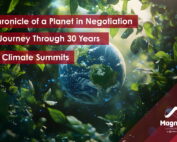In this new chapter of M·Talks, Silvia Urarte, an expert in sustainability and corporate social responsibility, CEO of Conética, and renowned podcaster in the SOS_tenibilidad program, shares her background and reflections on the current challenges in these fields.Her experience in different industries has allowed her to identify the best practices to integrate sustainability into business strategies and avoid falling into “greenwashing.”
The Evolution of Corporate Social Responsibility
Urarte highlights how sustainability has evolved from an isolated initiative to an essential component of corporate leadership. She stresses the importance of embedding sustainability into corporate strategy rather than limiting it to marketing efforts. She also points out the disconnect between Europe and North America in terms of legislation and priorities regarding sustainability, noting the recent decline of interest in the United States.
Challenges and Opportunities in Sustainability
One of the main obstacles in transitioning to a sustainable future is funding renewable technologies. Urarte notes that while there are promising innovations, many are still not mature enough to compete in the global market. She also warns about the uncertainty in the automotive industry due to the lack of preparation in electric vehicle charging infrastructure. To maintain competitiveness, she recommends agile decision-making based on clear strategies.
The Role of Transparency and Business Ethics
Transparent communication is key to avoiding ‘greenwashing’ and building consumer trust. Urarte emphasizes that companies must measure and honestly communicate their environmental impact rather than simply projecting a sustainable image. She also criticizes the disconnect between information on the extraction of materials such as cobalt and the lack of consumer action.
Sustainability and Social Development
Beyond environmental impact, Urarte underscores the link between sustainability and social well-being. Energy poverty and lack of access to basic resources are issues that companies can help address by integrating an ethical vision into their business models. Additionally, she highlights the need for political and business leaders committed to sustainability, pointing out that corruption remains one of the biggest obstacles to sustainable development.
Final Thoughts
Despite the challenges, Urarte remains optimistic about the positive role businesses can play in building a sustainable future. With a well-defined strategy, transparency, and a commitment to innovation, organizations can create a lasting impact on society and the environment.
If you found it interesting, please share it!
Recent Articles









